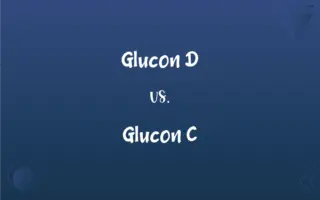Billiards Table vs. Pool Table: What's the Difference?
Edited by Harlon Moss || By Janet White || Published on January 30, 2024
Billiards tables are larger, with no pockets and used for games like carom; pool tables are smaller with pockets for games like eight-ball.

Key Differences
Billiards tables are typically larger, measuring around 10 feet in length, and are used for carom billiards, which does not involve pockets. Pool tables are smaller, usually about 7 to 9 feet long, and are designed for cue sports like eight-ball and nine-ball, featuring six pockets.
The playing surface of a billiards table is uniformly flat with no pockets, facilitating games that focus on caroming the balls off each other and the table's sides. In contrast, a pool table has a pocket at each corner and one at the midpoint of the longer sides, integral for pocketing balls in various pool games.
Billiards tables often have a heated slate under the cloth to ensure a consistent roll, which is crucial for the precision required in carom billiards. Pool tables typically do not have this feature, as the play in pool games is less affected by minor variations in the table surface.
In terms of cloth, billiards tables usually use a faster, thinner cloth to facilitate the sliding of balls over long distances without pockets. Pool tables use a thicker cloth to withstand the wear and tear of balls being pocketed and retrieved.
The cushions on a billiards table are designed for more accurate and consistent bounces, which is essential for carom billiards. Pool table cushions are designed to be responsive but are less focused on precision compared to billiards tables.
ADVERTISEMENT
Comparison Chart
Size
Typically larger, around 10 feet
Usually smaller, 7-9 feet
Pockets
No pockets
Six pockets (one at each corner and two in the middle)
Playing Surface
Uniformly flat for carom games
Designed with pockets for cue sports
Table Cloth
Faster, thinner cloth for sliding balls
Thicker cloth for durability
Cushions
Designed for precision and consistent bounces
Responsive but less precision-focused
ADVERTISEMENT
Billiards Table and Pool Table Definitions
Billiards Table
A billiards table often features a faster cloth for better ball movement.
The high-quality cloth on the billiards table allowed for faster shots.
Pool Table
A smaller table compared to a billiards table, usually with six pockets.
The pool table in the game room was a popular spot for guests.
Billiards Table
Used primarily for games focusing on the balls' trajectory and caroms.
Skilled players showcase their accuracy on the billiards table.
Pool Table
A table with pockets used for games like eight-ball and nine-ball.
He pocketed the eight-ball to win the game on the pool table.
Billiards Table
A large, pocketless table for playing carom billiards.
They played three-cushion billiards on the new billiards table.
Pool Table
Designed with responsive cushions for a variety of pool games.
The new pool table had excellent cushions for bank shots.
Billiards Table
A table with a flat surface specifically designed for precision in carom games.
The billiards table's heated surface ensured a smooth game.
Pool Table
Features a thicker cloth to endure the impact of pocketed balls.
The durable cloth of the pool table stood up to frequent play.
Billiards Table
Features precise and consistent cushions for accurate bounces.
The billiards table had new cushions for more consistent play.
Pool Table
Pool tables are common in recreational and casual gaming settings.
They spent the evening playing games on the bar's pool table.
FAQs
What is a billiards table?
A large table without pockets, used for carom billiards games.
What is a pool table?
A table with six pockets used for cue sports like eight-ball and nine-ball.
What are the dimensions of a typical pool table?
They range from 7 to 9 feet in length.
How big is a standard billiards table?
They're usually around 10 feet in length.
Can you play pool on a billiards table?
Not traditionally, as it lacks pockets necessary for pool games.
Is the cloth on pool tables more durable?
Yes, it's thicker to withstand the wear of pocketed balls.
Can the size of a pool table affect gameplay?
Yes, larger tables can offer a more challenging game.
Why don't billiards tables have pockets?
They're designed for carom games, which don't require pockets.
What type of games are played on a billiards table?
Mainly carom billiards, like three-cushion or straight rail.
Are pool tables suitable for professional competitions?
Yes, they are used in professional pool tournaments.
What makes the cushions on a billiards table unique?
They're designed for precision and consistency in bounce.
Do all pool tables have the same number of pockets?
Standard pool tables have six pockets.
Is it easier to play on a pool table?
It can be more accessible for casual players compared to the precision required for billiards.
Are pool tables common in bars and pubs?
Yes, they're popular in recreational and casual gaming spaces.
Can you convert a pool table to a billiards table?
Not typically, due to the fundamental differences in design and purpose.
What's the purpose of the heated surface on a billiards table?
It ensures a consistent roll of the balls.
Why is the cloth on a billiards table faster?
It facilitates the sliding of balls over longer distances.
Do billiards tables require more maintenance?
They may require specific care, especially for the heated surface and finer cloth.
Do billiards and pool tables use the same type of balls?
The balls may vary slightly in size and design, depending on the game.
Are billiards tables more expensive than pool tables?
Often, due to their size and specialized features.
About Author
Written by
Janet WhiteJanet White has been an esteemed writer and blogger for Difference Wiki. Holding a Master's degree in Science and Medical Journalism from the prestigious Boston University, she has consistently demonstrated her expertise and passion for her field. When she's not immersed in her work, Janet relishes her time exercising, delving into a good book, and cherishing moments with friends and family.
Edited by
Harlon MossHarlon is a seasoned quality moderator and accomplished content writer for Difference Wiki. An alumnus of the prestigious University of California, he earned his degree in Computer Science. Leveraging his academic background, Harlon brings a meticulous and informed perspective to his work, ensuring content accuracy and excellence.







































































